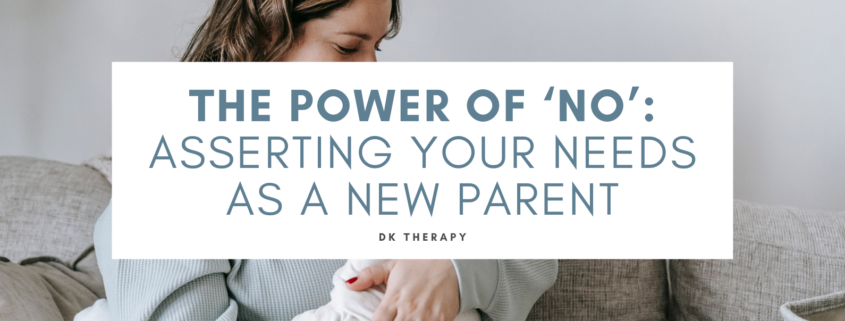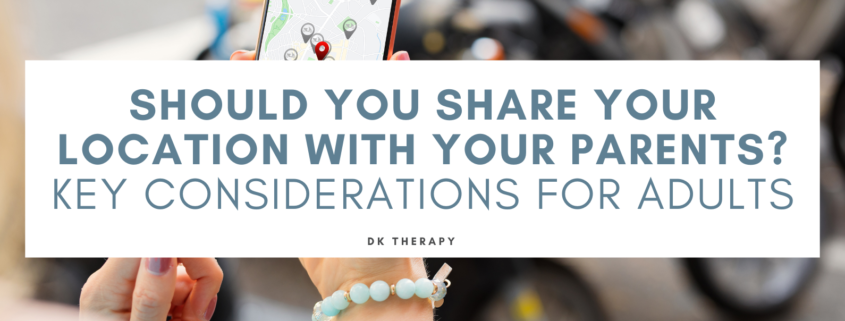Posts
The Power of ‘No’: Asserting Your Needs as a New Parent
/in Individual TherapyBecoming a parent for the first time is a life-changing and joyful experience, one that’s full of love, wonder, and the making of memories. However, it also comes with its share of challenges, including getting around the overwhelming expectations and demands that come from others. You can’t satisfy everyone, so one of the most powerful tools to equip during this time is the ability to say “no.”
Making your own needs and demands known is a must for maintaining your well-being as a new parent and making sure you’re doing what you believe is right for your child.

Saying “No” Is a Must as a New Parent
Saying “no” doesn’t mean you’re being negative or selfish at all. Taking this measure means that you’re setting boundaries to protect your child as well as your own mental, emotional, and physical well-being. As a new parent, your primary focus should be on nurturing both your baby and yourself. When you use the power to say “no” to commitments or pressures you’re not into, you make space for yourself to focus on what truly matters to you.
Common Situations Where Saying “No” Is OK
Plenty of potentially stressful events come up when you’ve just brought home a new baby, and regardless of those involved, it’s okay to say no to anything that isn’t necessary.
For example, family and friends may be eager to visit in order to meet the new baby. While that’s easy to understand, it’s also important to control the frequency and timing of these visits. When you need time to yourself and your child, you’re well within your rights to say no or suggest a more convenient time.
You may also find yourself on the receiving end of advice you didn’t ask for, which can get overwhelming fast. Politely declining advice that doesn’t fit your parenting style is unfortunately a normal part of the experience. Trust your instincts in these events and seek the advice of a professional when in doubt.
Your social life doesn’t end just because you’ve had a child, but when you’re just getting used to parenthood, these obligations can be draining. It’s okay to decline invitations to social gatherings when you’re not feeling up to it. As a new parent, rest and recovery is far more important than satisfying expectations.
Finally, if you’re balancing your career and parenting, it’s crucial to manage your workload effectively. Saying “no” to extra projects or overtime can help you maintain a healthy work-life balance.
How to Assert Your Needs as a New Parent
When you need to say no to a request obligation, be clear and firm about it. You’re going through a major life change and you don’t owe anyone an elaborate explanation when it comes to your needs. A simple “I appreciate the offer, but I can’t commit to that right now” is good enough.
If you’re feeling guilty, remind yourself that it’s okay to prioritize your needs. Parenting is very demanding, and taking care of yourself is not just beneficial but necessary. On top of being your own advocate, it’s wise to surround yourself with supportive people who respect your boundaries and will have your back in unpleasant situations. Be sure to communicate openly with your partner about your needs and work together to create the right environment.
Don’t think of standing up for yourself as being rude. As long as you conduct yourself politely, yet firmly, people who truly care about you will understand.
Embracing the power of “no” is a must when making it through the early stages of parenthood. This useful tool helps you prioritize your needs, manage your stress levels, and create a balanced environment in which your baby will thrive. Remember, saying “no” is an act of self-love and a step towards becoming the best parent you can be.
If you’re struggling as a new parent and you’d like to see what therapy can do for you, reach out to DK Therapy to schedule an appointment with our office.
Should You Share Your Location with Your Parents – Key Considerations for Adults
/in Individual TherapyOur world has become quite a digitally-influenced place, and because of this, sharing your location with others has become commonplace. Thanks to smartphones and other location-sharing programs, it’s easier than ever before to let someone know where you are. Though it’s convenient, location sharing comes with its own set of concerns, especially when it comes to sharing your whereabouts with your parents as an adult.
Let’s look at the pros and cons of sharing your location with your parents and weigh the balance between your privacy and safety.
Benefits of Sharing Your Location
It can be kind of annoying to have your parents know where you are at all times, especially as an adult. That said, there are a few benefits to this option.

Emergency Situations
In emergencies, having your location can allow your parents to provide immediate assistance or contact emergency services on your behalf. Whether you experience a medical emergency, an accident, or you just get lost, being able to pinpoint where you are can be a real lifesaver.
On top of that, knowing that your parents can find you in the event of an emergency offers both of you peace of mind. It can reduce worry for your parents and remind you that someone is looking out for you, no matter your age.
Safety Check-Ins
When traveling alone, especially in unfamiliar places, location sharing can be a precautionary measure. It ensures someone knows your whereabouts and can check in on you if needed. For example, sharing your location when you’re out at night (especially in a potentially unsafe environment) can provide you with an extra layer of security. Sharing lets your parents monitor your journey and make sure you make it to your destination safely.
Drawbacks of Location Sharing
Of course, staying on your parents’ radar can be a great security measure, but if they’re especially meddling, it can be just as much of a hassle.
Independence and Autonomy
As an adult, maintaining independence is crucial. Sharing your location constantly can feel intrusive and undermine your sense of independence. In these situations, establishing boundaries and demanding some semblance of privacy is a must.
Furthermore, over-reliance on location sharing can point to a lack of trust on your parents’ part. You’re an adult, and it’s important for your loved ones to trust that you’re taking care of yourself while you’re living your life. Very few adults are okay with constant monitoring.
Privacy Concerns
Location sharing involves making sensitive information viewable, which might put it in the hands of unauthorized parties. Make sure your location data is secure so that you can protect your privacy.
Many young adults are also worried that sharing their location will lead to their parents misusing the information. Parents may very well overstep your boundaries by using your location sharing to monitor all of your comings and goings.
How to Find Balance
If you want to share your location for safety purposes but you don’t want to encourage constant surveillance, express your wishes before you share. Establish clear boundaries on when and why you’ll share where you are or where you’re going.
Instead of constant tracking, you may also choose to periodically share location updates. For example, you could share your location when you reach a destination, or if plans change. This way, they know where you are without being too involved with your business.
Sharing your wherabouts with your parents as an adult is a personal decision that calls for balancing safety and privacy. While it can provide peace of mind and enhance safety in certain situations, it’s important to make sure your parents respect your boundaries. Remember, the choice to share is ultimately yours.
If you’re struggling and you’d like to see how therapy could benefit you, reach out to DK Therapy and schedule an appointment with our office.
Setting Healthy Boundaries and Why They Matter
/in From the Therapist's ChairLatest Blog Posts
 What Is Liberosis? The Desire to Care Less ExplainedFebruary 11, 2026 - 4:36 pm
What Is Liberosis? The Desire to Care Less ExplainedFebruary 11, 2026 - 4:36 pm How to Heal From the Emotional Aftermath of the HolidaysFebruary 2, 2026 - 9:00 am
How to Heal From the Emotional Aftermath of the HolidaysFebruary 2, 2026 - 9:00 am What Makes Friend Breakups So Surprisingly Devastating?January 27, 2026 - 5:24 pm
What Makes Friend Breakups So Surprisingly Devastating?January 27, 2026 - 5:24 pm How To Remain Hopeful in a Struggling Job MarketJanuary 19, 2026 - 9:00 am
How To Remain Hopeful in a Struggling Job MarketJanuary 19, 2026 - 9:00 am The Power of Self-Disclosure by a TherapistJanuary 2, 2026 - 5:00 pm
The Power of Self-Disclosure by a TherapistJanuary 2, 2026 - 5:00 pm






